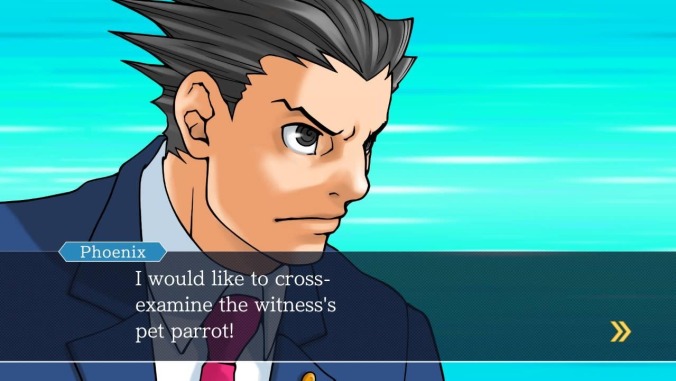The comforts of a truly stupid mystery solved

“Comfort gaming” is a regular refrain these days; even as other industries slow down, gaming continues to plug along, offering up a steady stream of welcome distractions, whether in the form of gorgeously realized Japanese islands full of people to hit with swords, or a continuing trove of great indie releases with less melodramatic concerns on their mind. Which is kind of the point: Comfort gaming is as varied as comfort itself, and whether you’re relaxing by planting trees and seeking hang sessions, or guiding a Satanic locomotive through the gates of hell, we’re all looking for a little relief. For me, that means finding very stupid problems and solving the ever-loving shit out of them.
Lately, I’ve been getting my fix for this very particular need by re-playing all the games in Capcom’s Ace Attorney series of legal-based puzzlers, in which you play a defense attorney tasked with untangling the world’s most stupidly convoluted murder cases. Pretty much every problem in Phoenix Wright Land is a dumb problem. This is a universe where nobody ever just gets mad and shoots a guy. Instead, they could spend 30 years constructing an elaborate revenge scheme, complete with misdirection, patsies, and, in one case, a decision to carry a bullet around in their own shoulder for more than a decade. I’m only two games in, and I’ve already interrogated parrots, cross-examined a ventriloquist’s dummy, and solved multiple cases in which actual, no-fucking-around ghosts were a factor. (You’d think the existence of the latter might have a slightly larger impact on the legal community than the bemusement of a few court officials, but such is life in Phoenix Land.)
I love it. For the unfamiliar, the Phoenix Wright games are all about taking big mysteries and breaking them down into small parts, as Phoenix picks through witness testimonies, teasing out lies by offering up contradicting evidence. Although the logic is occasionally a bit twisted (and annoyingly poorly worded, despite a generally top-notch translation), it’s also immensely comforting. This series—and others that have followed in its footsteps, like Danganronpa and the absolutely delightful FMV goof-fest Contradictions—are the natural successor to the genre of “fair play” mystery novels: Everything happens for a reason, and as long as you keep thinking at them, you can unravel even the most elaborately parrot-based of crimes.
That is: In a world made for mystery solvers, every mystery has to make sense. It’s not just that truth is so much stranger than fiction in this case; it’s also much more poorly edited. The real world—especially now—is filled with loose ends, plot twists that don’t go anywhere, and Paul Auster-levels of existential mystery that can never, conceivably, be solved. No wonder it’s a relief to play in a reality where Chekov’s gun is still on the mantle, where every single clue has its accompanying mystery it clicks snugly into. The problems in the Phoenix Wright games are dumb, yes. But they’re still problems predicated on a world that makes a fundamental sort of sense, where there has to be a reason that bird said that thing when it did. No fucking wonder they’re such a comfort in the current moment, huh?